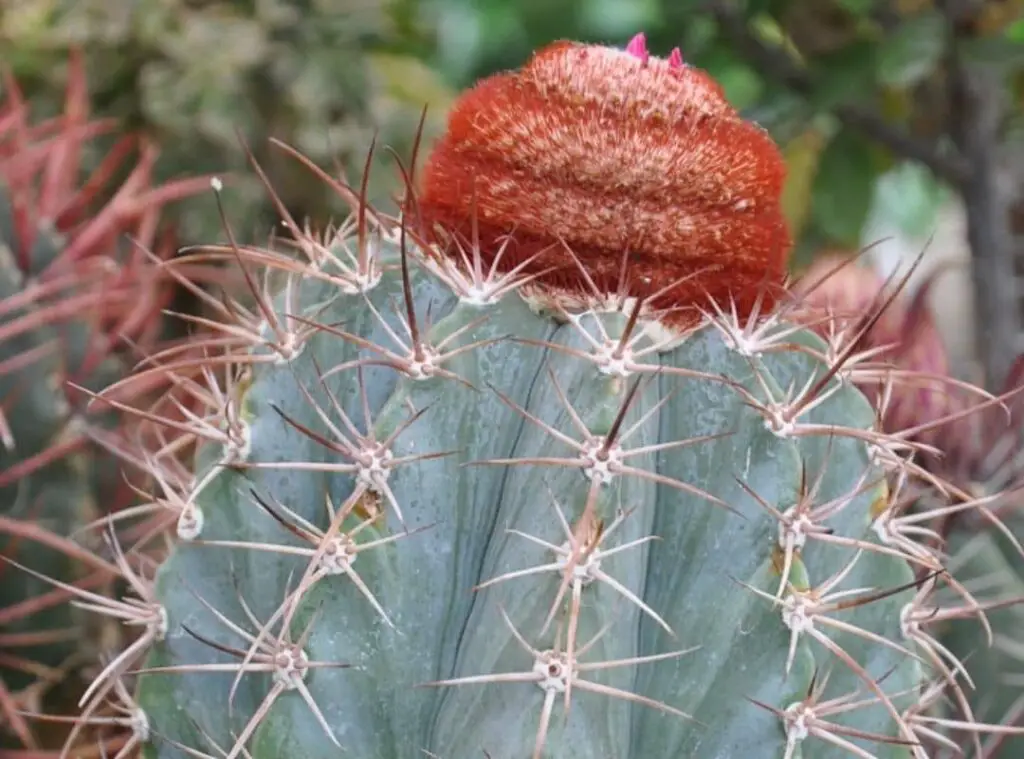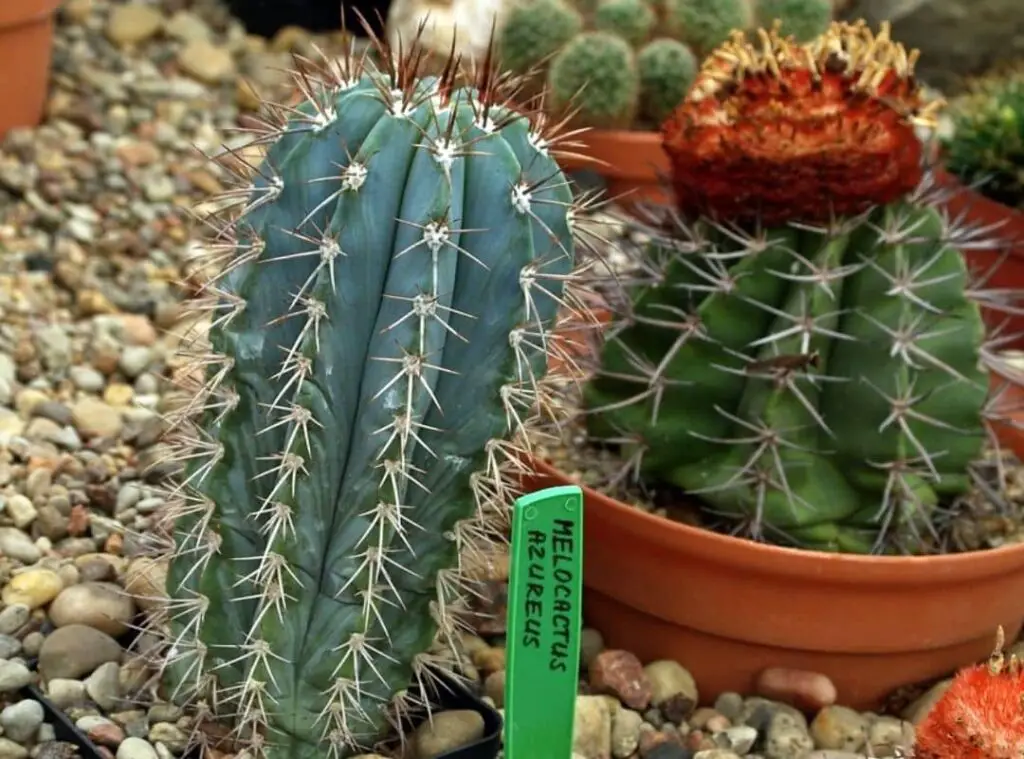Melocactus azureus is a famous cactus which many people are willing to add in their indoor garden collections.
They are used to grow in hot and dry weather. Turk’s cap cactus is the common name of the Melocactus azureus cactus. Further, they are native plants in Central and northern Bahia, eastern Brazil.
In fact, succulent enthusiasts prefer to grow Melocactus azureus cactus due to the striking frost blue epidermis it has.
However, cultivating them indoors is a little tricky task. Melocactus azureus cactus are more delicate when compared with other cacti. Hence, I would suggest Melocactus azureus cactus would suit mainly for the experienced gardeners.
This article is about the right growing conditions you need to provide when you grow them. Furthermore, I am going to cover their propagation methods as well.
Additionally, I will be covering the diseases and the illnesses they may go through as well. If you are excited to learn more about these beauties, this article is for you.

How do I identify Melocactus azureus?
You can identify the Melocactus azureus mainly by its spherical body. You could spot it either in gray or bluish color.
It would reach a maximum height of 12 inches. Besides, their maximum diameter would be 8 inches, when they grow to their fullest potential.
Melocactus azureus cactus consist of about 9-10 triangular ribs. Moreover, they will comprise 1-4 radial spines as well.
In terms of flowering, Melocactus azureus cactus would produce blooms either in magenta or pink. They will arise in the wooly area.
It is called cephalium and it will appear either in white or in red. They will not produce flowers until they become mature.
Melocactus azureus cactus flowering season would be in mid-summer. Moreover, they will produce a fruit which is as long as 2 cm.
Size of the plant
They will rise to 12 inches in height when they fully grow. Further they would be 8 inches widespread.
Growth rate
They grows at a medium speed.
One look care guide
| Botanical Name | Melocactus azureus |
| Common Name | Turk’s cap cactus |
| Plant Type | Cactus |
| Mature Size | 12 inches in height / 8 inches in width. |
| Sun Exposure | Full sunlight to partial shade |
| Soil Type | Well-draining |
| Soil pH | Neutral |
| Bloom Time | Summer |
| Flower Color | Red, white |
| Hardiness Zones | USDA hardiness zone 10a |
| Native Area | Brazil |
| Toxicity | Non-Toxic |
| Average price | 12 USD |
How do you take care of Melocactus azureus?
As aforementioned, Melocactus azureus cactus care is somewhat difficult when compared to other succulents and cactus as they need a specific care treatment.
Light Requirement
They will perform well given that you expose them for full sunlight to partial shade.
Bright sunlight in the morning would be more appropriate for the Melocactus azureus cactus.
However, you need to limit exposing them to bright sunlight and avoid exposing them to bright sunlight for extended periods.
You will see how they become bronze when you expose them to bright sunlight. Moreover, it is critical that you supply them sufficient sunlight as only then they can produce the spines well.
And, it will stimulate the flowering of flowers as well.
Temperature and humidity
Melocactus azureus cactus prefer to have warmer temperatures during their growth. They cannot withstand the colder temperatures at all.
If there is a forecast of colder weather along with frost, you need to relocate the Melocactus azureus cactus indoors.
Is it cold hardy?
Melocactus azureus cactus are not frost hardy plants.
Is Melocactus azureus cactus an indoor plant or an outdoor plant?
You can grow Melocactus azureus cactus both indoors and outdoors.
USDA Hardiness Zone
They are hardy in USDA hardiness zones 10a.

Watering Requirement
They have typical watering requirements. Literally you should water these plants only if their soil is dry.
When you stick to that guideline, you will not end up over watering them which leads to root rot whilst allowing the plants to stay hydrated too.
A minimal watering would be sufficient for the Melocactus azureus cactus during winter as they are dormant during winter.
Having said that, you should not leave them to become bone dry also during winter. You can suspend watering many cacti during winter.
However, it will not work with the Melocactus azureus cactus as they want to have minimal water during the winter also. In fact they are quite responsive towards the lack of water.
Best is to water the Melocactus azureus cactus from time to time as they need more water when compared to the rest of other cacti.
Having said that, they would not prefer to stay in waterlogged conditions either.
Ideally you need to water them from time to time whilst allowing the soil to dry between two watering sessions.
You may stick to that during both summer and winter. If you live somewhere where you get frost, do not water them more than two times a month.
Soil Requirement Type / ph.
They prefer to have an excellent draining soil mix. That will ensure that they grow well without having any root rot.
Refrain from growing them in a regular soil mix as they do not contribute to fast draining of the soil mix. If you wish, you may also make an appropriate soil mix on your own too.
If you wish to enhance the draining of the soil mix, you can consider adding elements such as pumice or perlite in balanced amounts.
Pot size Potting and Repotting.
In terms of choosing the right pot type, the ideal pot is a terracotta pot as they ensure fast drainage.
Moreover, it has to have sufficient draining holes as well. Melocactus azureus cactus can outgrow in the pots relatively faster. Repot them when they are actively growing. Further before repotting, make sure that their soil is dry.
You may continue with the general succulents repotting practices when repotting these plants also. Next you can replant them in a fresh pot and in a fresh well-draining soil mix.
Allow them to settle in the new growing conditions whilst skipping watering them for about one week’s time.
Where to Plant.
You need to plant the Melocactus azureus cactus in a fast-draining soil mix as aforesaid.
I believe Melocactus azureus cactus would suit outdoors conditions well simply because of the requirement they have in the sunlight.
However, do not expose them to excessive sunlight for prolonged periods as it would cause sunburns in the plants.
Hence if you are experiencing intense sunlight, you can move the plants to a shady place to protect them from such unhealthy conditions.
They would be great picks for indoor gardening as well. However, if you wish to grow them as houseplants, ensure that you are proving optimal conditions by placing them near a bright sunny window.
Again, if you are experiencing excessive sunlight, you need to bring them to a shade.
If you have grown them outdoors during fall and winter, you need to bring them indoors as Melocactus azureus cactus are not frost hardy plants.

Flowers
Melocactus azureus cactus produce flowers in red or white during mid-summer.
Fertilizer and time of year
A mineral fertilizer would go well with the Melocactus azureus cactus. Furthermore, you can apply these fertilizers during summer.
Only then the plant’s vigorous growth would be benefitted from fertilizing. You may also use a cactus fertilizer after diluting it with water into half strength.
Consider feeding them once every 4 – 8 weeks when they are actively growing.
Dormancy
Melocactus azureus cactus dormancy season would be in winter.
Toxicity
Melocactus azureus cactus are nontoxic plants.
Common bugs and illnesses
Melocactus azureus cactus may suffer from root rot mainly.
Over watering is the root cause for this and it will further make the plants more vulnerable for the rest of other fungal and bacterial infections as well.
Special Care tips.
Melocactus azureus cactus do not need pruning
How to propagate Melocactus azureus
You can use Melocactus azureus seeds to propagate them. Best time to conduct propagation is either spring or summer.
You can simply sow the seeds in a well-draining soil mix where you have added vermiculture. When you sow them, you can scatter the seeds without piling them up.
It will take about 17-20 days for the germination to take place. You need to cover the germination tray with glass so that it will avoid the seeds drying out.
The best temperature which would work with these seeds would be 18 degrees – 22 degrees Celsius.
Conclusion
Before concluding, Melocactus azureus cactus are such graceful, unique looking plants which are worth having.
So, trust this article was useful for you to improve your knowledge on growing the Melocactus azureus well.
Read Next : Melocactus Peruvianus | A Cup Cake Shaped Unusual Cactus | Melocactus Zehntneri | A Cup Cake Shaped Unusual Cactus |
